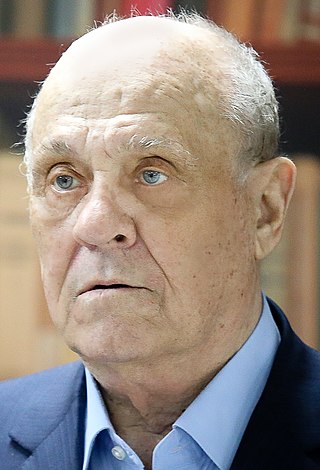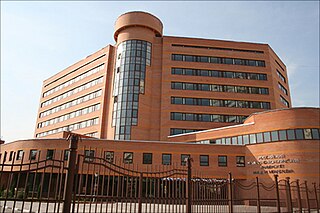
The Russian Academy of Sciences consists of the national academy of Russia; a network of scientific research institutes from across the Russian Federation; and additional scientific and social units such as libraries, publishing units, and hospitals.

Isaak Izrailevich Brodsky was a Russian painter and draughtsman of Jewish descent best known for his portrayals of Vladimir Lenin and other Soviet leaders, renowned as blueprint examples of the Socialist realist style.

Vladimir Iosifovich Veksler was a prominent Soviet experimental physicist.

MIREA — Russian Technological University is The Federal State Budget Educational Institution of Higher Education «MIREA — Russian Technological University». It is a higher educational institution in Moscow, Russia, which is an educational, research and innovation complex. It was ranked # 1,960 globally in 2023 by US News & World Report.

Vladimir Valentinovich Menshov was a Soviet and Russian actor and film director. He was noted for depicting the Russian everyman and working class life in his films. Although Menshov mostly worked as an actor, he is better known for the films he directed, especially for the 1979 melodrama Moscow Does Not Believe in Tears, which won the Academy Award for Best Foreign Language Film. Actress Vera Alentova, who starred in the film, is the mother of Vladimir Menshov's daughter Yuliya Menshova.

D. Mendeleev University of Chemical Technology of Russia (MUCTR) is a public research university in Moscow, and is the largest Russian center for education and research in the field of chemical technology. The history of MUCTR can be traced back to the Moscow Industrial School initially founded in 1898. The university acquired its current name and status in 1992 with its Moscow campus mainly located on Miusskaya Square and in Tushino. The university's other two branches are situated in Novomoskovsk and Tashkent (Uzbekistan). In 2023, the university was ranked # 1,955 by US News & World Report.

Nikolay Fyodorovich Gamaleya was a Russian and Soviet physician and scientist who played a pioneering role in microbiology and vaccine research.
The Russian Academy of Natural Sciences is a Russian non-governmental organization founded on August 31 1990 in Moscow in the former Soviet Union, following a decree by the Supreme Soviet of Russia. As of 2018, the Academy operates under the Federal Law of August 23, 1996 No. 127-FZ "On Science and State Scientific-Technical Politics".

Leyla Vladimirovna Adamyan is a Soviet and Russian obstetrician-gynecologist, doctor of medical sciences, teacher, professor of Armenian descent.
Ivan Pavlovich Neumyvakin was a Soviet physician, Doctor of Medical Sciences, Professor and Fellow of the Russian Academy of Natural Sciences. Laureate of the 1982 Latvian SSR State Prize and of the 2005 "Profession - Life" International Prize. He is known in Russia as one of the founders of space medicine. He also is known as a healer. He received the honorary titles 1979 "Honoured Inventor of the RSFSR" and the 2006 "The Person of Russia" and the title "Distinguished Healer of the Russia" and the title "Maitre of Science and Practice". He was a popular author. His book Endoecology of health is a best seller. Marie Claire magazine named him "Guru of healthy lifestyle".
The Friedmann Prize is a Soviet and Russian physics prize, awarded for outstanding work in cosmology and gravity, as well as earth sciences. It is named after the Russian cosmologist Alexander Alexandrovich Friedmann.
Vadim Izrailevich Agol is a Soviet Russian virologist and geneticist. He was given the distinction of Honored Scientist of the Russian Federation in 1999.
Events in the year 2021 in the Russian Federation.
Kenzhegali Abenovich Sagadiyev was a public and political figure in Kazakhstan, an Academician of the National Academy of Sciences of the Republic of Kazakhstan.
2022 in Russia is the 31st year of the Russian Federation.
Events in the year 2023 in Russia.
Eugene Alekseyevich Kosminsky was a Soviet historian and medievalist, Academician of the Academy of Sciences of the Soviet Union. He was a professor at the Lomonosov Moscow State University, first Head of the Department of History of the Middle Ages at MSU Faculty of History from 1934 to 1949. Laureate of the 1942 Stalin Prize.

Lev Aleksandrovich Zilber was a Soviet micro-biologist, virologist, and immunologist; academician of the USSR Academy of Medical Sciences, founder of the Soviet school of virology. The elder brother of the writer Veniamin Kaverin.
Ninel Grigoryevna Artsimovich also transliterated Arzimowitsch was a Soviet, Russian professor, doctor of medicine and immunology. She received the award of Honored Scientist of the RSFSR (1990). Her husband was Lev Artsimovich.

Dmitry Yurievich Pushkar is a Russian urologist, scientist, practicing surgeon, Doctor of Medical Sciences, professor and academician of the Russian Academy of Sciences (2019). Head of the Department of Urology, Russian University of Medicine, Ministry of Health of Russia. Head of the Moscow Urological Center based at the Botkin Hospital. Laureate of the State Prize of the Russian Federation in the field of science and technology (2022).










